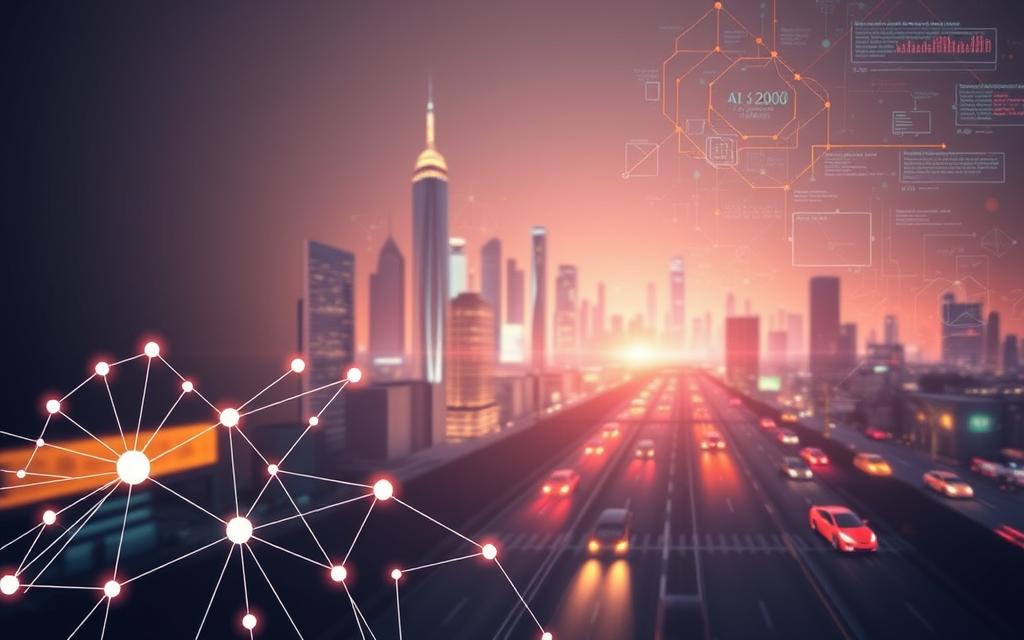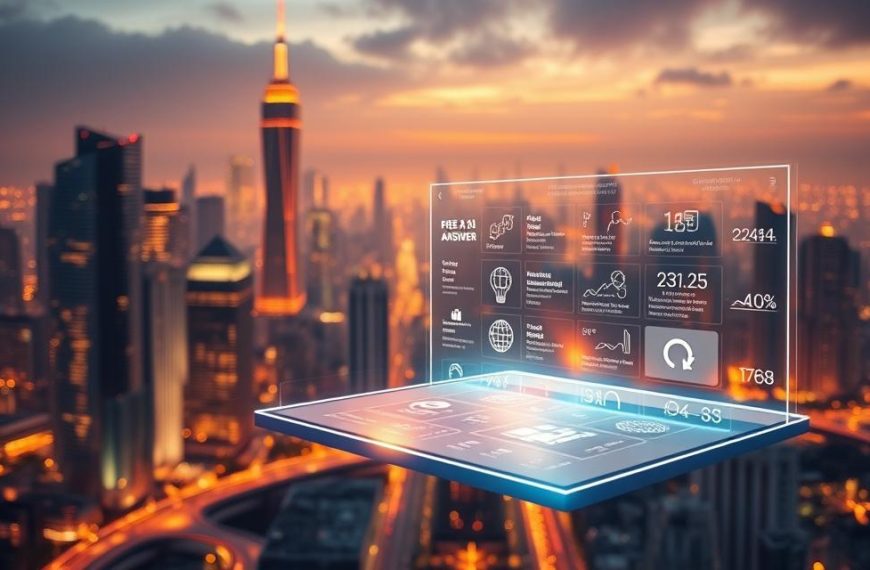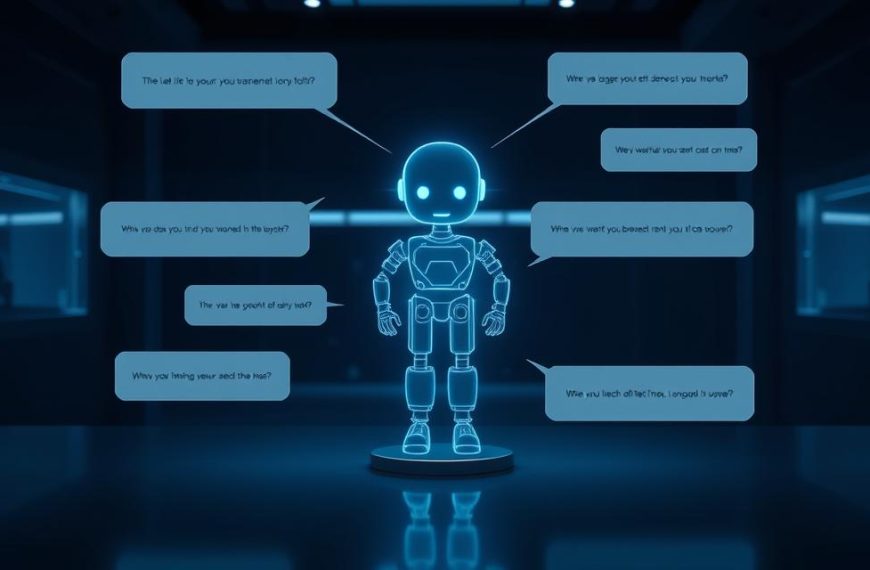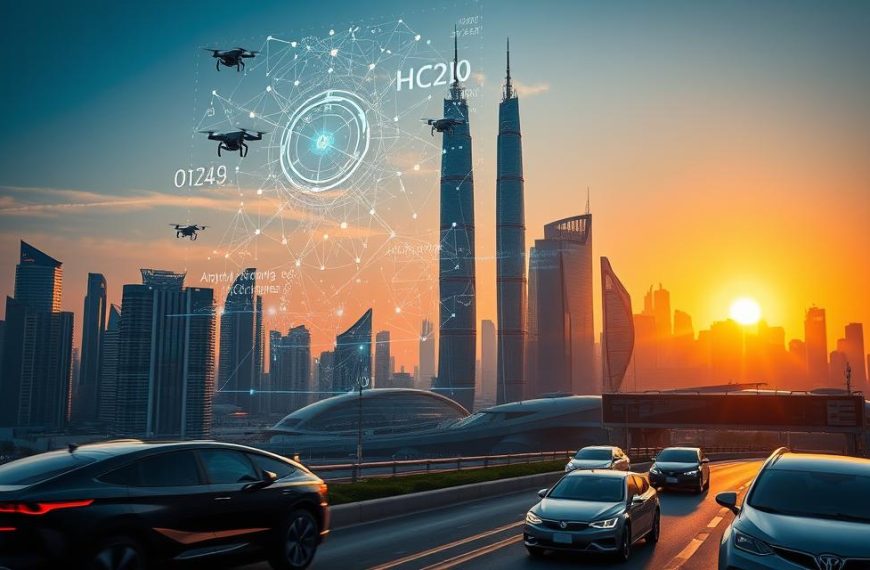Artificial intelligence has changed our lives in many ways, often without us noticing. It affects us from waking up to bedtime. This technology shapes our daily experiences.
When you search online in the morning, or get movie and music suggestions, AI is at work. It learns from you to give you better content and answers. Even your voice assistants like Siri and Alexa use AI.
AI’s impact isn’t just in our homes. It’s also changing how businesses work. Tools like Rovo help companies use AI in their daily tasks. This boosts productivity in tools like Jira and Confluence.
Understanding AI is now key for everyone in today’s digital world. It’s not just for tech experts anymore. Knowing about AI is important for both our personal and work lives. Its power is growing, making it essential to understand.
Understanding Artificial Intelligence and Its Relevance
Artificial intelligence has moved from being just a movie dream to a real part of our lives. It’s changing how we work and live. Yet, many people find it hard to understand what it is and how it works.
Defining AI: Beyond Science Fiction
Artificial intelligence means computer systems that can do things that humans do. Unlike movie robots, real AI is about things like recognising patterns and solving problems.
Core Concepts: Machine Learning and Deep Learning
Machine learning is the base of most AI today. It lets computers learn from data without being told how. For example, spam filters get better at spotting unwanted emails by looking at lots of messages.
Deep learning goes further by using artificial neural networks. These networks are like the human brain and are great at tasks like recognising images and speech. Your phone’s face unlock feature uses deep learning to match faces.
Most AI today is narrow AI. This means it’s made for specific tasks. Things like voice assistants and self-driving cars are examples. They do their jobs well but don’t understand everything.
General AI is something we’re working towards. It would be like having a computer that can do anything a human can. But for now, we’re focusing on narrow AI that can help us right now.
Why AI Matters in the Modern World
AI is more than just a new technology. It’s changing how businesses work and how we solve big problems.
AI’s Pervasive Influence Across Industries
AI is being used in almost every field to make things better:
- Healthcare: AI looks at medical images to find diseases early
- Finance: AI spots fraud in real-time
- Retail: AI gives you shopping tips based on what you like
- Manufacturing: AI predicts when machines will break down
The Role of Data in AI Development
Data in AI is like fuel for learning. The better the data, the better the AI. Lots of different data helps AI make better choices.
As IBM’s artificial intelligence resources say, good data is key for AI to work well. Companies need to collect and sort data well to get the most from AI.
More data means better AI, which in turn makes even more valuable data. It’s a cycle that helps everything get better.
The Benefits of Artificial Intelligence
AI technology brings real improvements in efficiency, healthcare, and daily life. It shows how artificial intelligence is changing our world for the better.
Enhancing Efficiency and Productivity
Artificial intelligence makes operations more efficient in many industries. Companies use AI to make processes smoother and cut costs.
Automation in Manufacturing and Logistics
AI-powered robots do repetitive tasks with precision. They work non-stop, boosting production.
Logistics use AI to find the best delivery routes. This cuts down fuel use and ensures on-time deliveries. AI also helps with managing stock and warehouse tasks.
AI-Driven Analytics for Business Insights
Advanced analytics tools quickly process huge data sets. They spot patterns and trends that humans might miss.
These insights help businesses make smart choices. Predictive analytics forecast market changes and customer behaviour. This gives companies an edge in fast-changing markets.
Advancements in Healthcare and Medicine
The impact of AI in healthcare is huge. Medical professionals use AI tools to improve patient care.
Diagnostic Tools and Personalised Treatment
AI algorithms accurately analyse medical images. They find problems earlier than traditional methods.
These tools help doctors create treatment plans tailored to each patient. They consider unique patient factors and medical history. This leads to better health outcomes.
Drug Discovery and Research Acceleration
Pharmaceutical companies use AI to speed up drug development. Machine learning models study molecular structures and predict how well compounds work.
This shortens research time from years to months. AI also spots possible side effects early. These advances in AI healthcare research save lives and money.
Improving Daily Life Through AI Applications
Artificial intelligence makes daily life better with smart technologies. These applications make life easier and more efficient.
Smart Assistants and Home Automation
Voice-activated assistants like Alexa and Google Assistant respond to voice commands. They control home devices, play music, and give information.
Smart home systems learn what you like over time. They adjust lighting, temperature, and security automatically. This makes homes more comfortable.
AI in Education and Learning Platforms
Educational platforms use AI to tailor learning experiences. They adjust content based on how each student is doing.
These systems find knowledge gaps and offer specific exercises. They give feedback right away and support different learning styles. This makes learning more effective and accessible.
| Sector | Primary AI Benefit | Impact Level | Example Applications |
|---|---|---|---|
| Manufacturing | Process Automation | High | Robotic assembly, quality control |
| Healthcare | Diagnostic Accuracy | Critical | Medical imaging, patient monitoring |
| Education | Personalised Learning | Medium-High | Adaptive curricula, skill assessment |
| Home Life | Convenience & Efficiency | Medium | Smart devices, voice assistants |
| Business | Data-Driven Decisions | High | Market analysis, customer insights |
AI’s benefits are vast and growing across many areas. From factories to homes, AI technologies bring real improvements in how we work and live.
Addressing the Central AI Question
Artificial intelligence is growing fast, raising many questions and concerns. This section looks into the main issues around AI, separating fact from fiction. It also explores the balance between tech progress and responsible development.
Common Concerns and Misconceptions
Many people worry about AI, often because of scary media and not fully understanding it. These AI concerns need careful thought, not just dismissal.
Job Displacement and Economic Impacts
The worry about job displacement is a big topic with AI. History shows that new jobs often come with new tech, even if old ones go.
Studies say AI might automate 30% of some jobs. But it could also create new jobs we can’t even imagine yet. We need to plan and retrain workers for this change.
| Sector | Projected Job Reduction | Emerging New Roles | Timeline |
|---|---|---|---|
| Manufacturing | 15-25% | AI maintenance technicians | 2024-2030 |
| Customer Service | 30-40% | AI interaction specialists | 2023-2028 |
| Transportation | 10-20% | Autonomous vehicle supervisors | 2025-2032 |
| Healthcare Administration | 25-35% | Medical data analysts | 2024-2029 |
AI Safety and Control Issues
There are big questions about AI safety and how to control it. The rise of self-driving cars shows these concerns clearly.
Self-driving cars could cut down on accidents by removing human error. But they also raise big questions about making decisions in emergencies.
More money is going into AI safety research. This is helping to make sure AI works as it should. Good rules for AI are becoming more important.
Balancing Innovation with Caution
AI is moving fast, and we need to be careful. We must move forward but also make sure we’re safe.
Ethical Dilemmas in AI Deployment
There are many ethics in AI questions when we use AI. For example, AI hiring tools can show bias if not made right.
Facial recognition tech has shown bias too. This has led some places to limit its use until it’s fair. It shows how important it is to have diverse teams and test well.
“The development of full artificial intelligence could spell the end of the human race. It would take off on its own, and re-design itself at an ever increasing rate.”
Public Perception and Trust in AI Systems
Getting people to trust AI is key. Being open about how AI works helps. It makes people less worried about “black box” systems.
Surveys show people trust AI more in some areas than others. They’re more okay with AI in making things and analysing data than in personal care or legal decisions.
Companies that explain AI well and talk about its limits get more trust. This way, they manage expectations and show they’re using AI responsibly.
Ethical Considerations in AI Development
Artificial intelligence is now a big part of our lives. This means we must think carefully about ethics in AI. We aim to make AI systems that help society and avoid harm.
Bias and Fairness in Algorithmic Decision-Making
One big challenge in AI ethics is algorithmic bias. Machine learning models can learn from old data. This can make them carry and even grow existing biases.
Examples of Bias in AI Systems
Bias in AI is seen in many areas. For example, hiring tools can unfairly pick against women. Facial recognition systems often make mistakes with people of colour.
Loan approval systems can discriminate against minorities. Predictive policing tools also show bias against certain areas. These examples show we need fairness in AI decisions.
- They use diverse data to train models.
- They do regular bias checks and fairness tests.
- They have teams with ethicists and social scientists.
- They are open about their data and methods.
Privacy and Data Security Challenges
AI needs a lot of data, which raises big privacy in AI issues. We must find a balance between innovation and protecting people’s rights.
Surveillance and Data Collection Concerns
AI surveillance can collect a lot of personal info. Smart cities, work monitoring, and tracking systems all pose data security risks.
These systems can identify people without their say-so. They can also track behaviour and guess personal traits. The big amount of data processing is a privacy risk.
Regulatory Frameworks and Compliance
Many governments have made laws to protect AI privacy. The GDPR in Europe is strict about data handling. In the US, some states have their own privacy laws.
| Regulatory Framework | Key Requirements | Geographical Scope | Enforcement Mechanisms |
|---|---|---|---|
| GDPR | Data minimisation, purpose limitation | European Union | Hefty fines up to 4% of global revenue |
| CCPA | Consumer rights to access and deletion | California, USA | Civil penalties and private right of action |
| AI Act (Proposed) | Risk-based classification system | European Union | Graduated penalties based on violation severity |
To follow these laws, companies must design privacy into their systems. They need to do data impact assessments and be open about how they process data. They also need clear rules for data security management.
The Future of Artificial Intelligence
We’re at the start of a new era where AI will do more on its own. This change will affect many areas, including work and how we use technology.
Emerging Trends and Technologies
AI is changing fast. New developments are set to lead the way in AI research and use.
Advances in Natural Language Processing
Natural language processing has made big leaps. Now, AI systems understand context, tone, and even cultural references well.
These advances mean we have smarter chatbots that can answer complex questions. Translation tools are also getting better, helping us talk across languages in real time.
AI is now learning to understand and respond to our emotions. This is a big step forward.
Autonomous systems are a big part of AI’s progress. Self-driving cars are getting better at navigating and making decisions.
Autonomous systems are also appearing in other areas like manufacturing and homes. They can make decisions and adjust things without us.
AI agents are getting smarter at setting and achieving goals on their own. They can look at complex situations and decide the best course of action.
Long-Term Implications for Society
AI will change society a lot. It’s important to think about what this might mean for us.
Potential Scenarios: Utopian vs. Dystopian Outcomes
The future could be very different, depending on how we use AI. We need to think about both the good and bad possibilities.
| Utopian Possibilities | Dystopian Risks | Probability Factors |
|---|---|---|
| Disease eradication through advanced medical AI | Mass unemployment from automation | Regulatory frameworks |
| Personalised education for all students | Privacy erosion through surveillance | Ethical development standards |
| Environmental problem-solving | Weaponisation of autonomous systems | Public acceptance levels |
| Enhanced creative collaboration | Algorithmic bias amplification | Technical safety measures |
AI could lead to big improvements in healthcare, like finding cures for diseases. It could also make education better for everyone.
But, there are worries about jobs being lost. There’s also the risk of AI being used for bad things, like spying or making weapons.
Preparing for an AI-Driven Future
We need to get ready for a future with more AI. There are many ways to do this.
Schools should teach skills that work well with AI. Things like thinking critically, being creative, and understanding emotions will be key.
We also need rules to make sure AI is used right. Working together globally will help set standards for everyone.
Talking openly about AI’s role in our lives is important. This helps build trust and understanding. Being open about how AI works and what it can do will help us use it better.
Creating a future with AI means finding the right balance. With careful planning and thinking about ethics, AI can help us grow, not hold us back.
Conclusion
This look into artificial intelligence gives us a full picture of where it stands today and where it’s headed. We’ve seen both the amazing benefits and the real worries about AI’s growth.
Our key findings show how AI is changing the game in many fields. It’s making healthcare better and making our daily lives easier. AI is truly changing our world in big ways.
But we must think carefully about the ethics of AI. We need to tackle issues like bias, fairness, and privacy. These are big challenges that need smart solutions.
As we look to the future of AI, new trends are emerging. We should be excited but also careful. It’s important to balance our hopes with caution.
AI is a huge leap forward for humanity. Knowing its strengths and weaknesses helps us use it wisely. This way, AI can help us move forward in a good way.

















